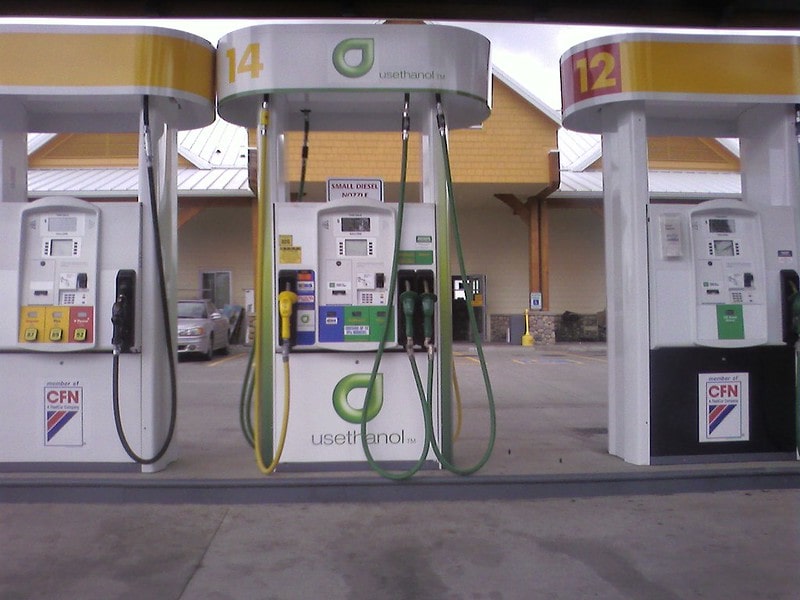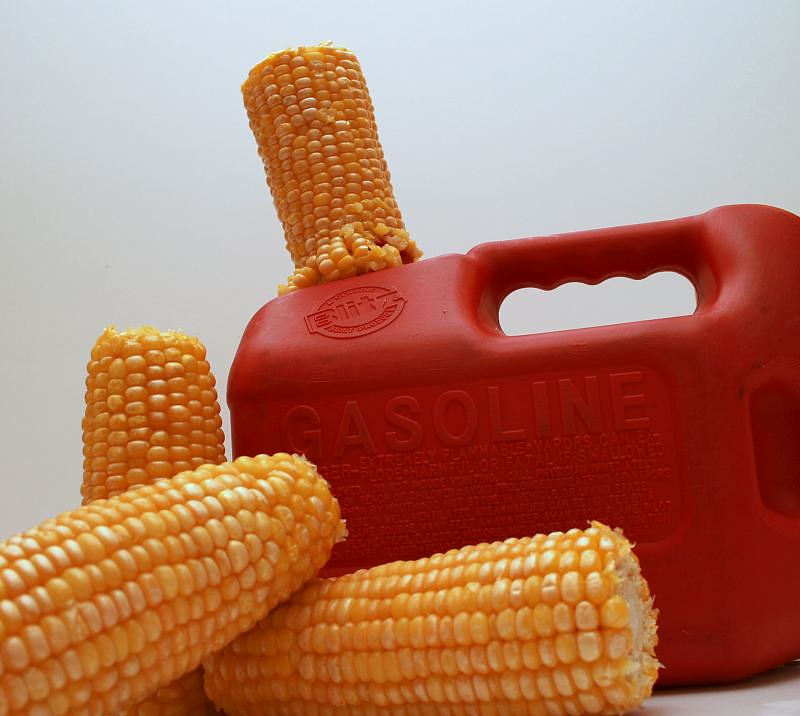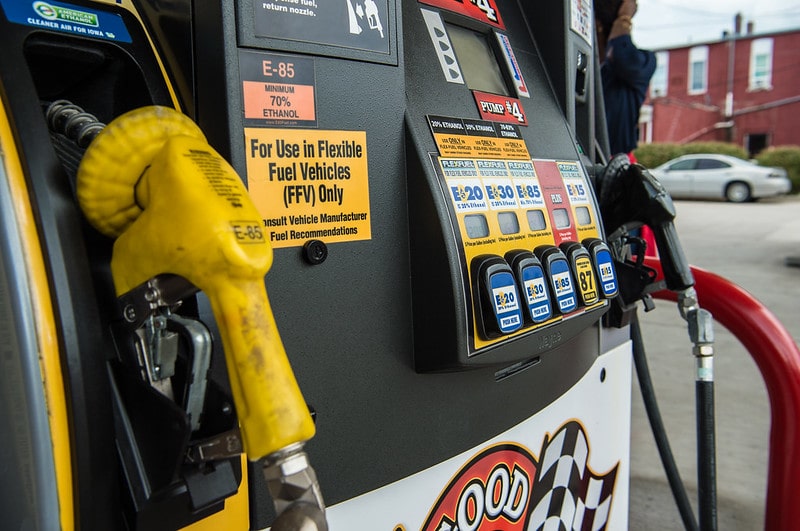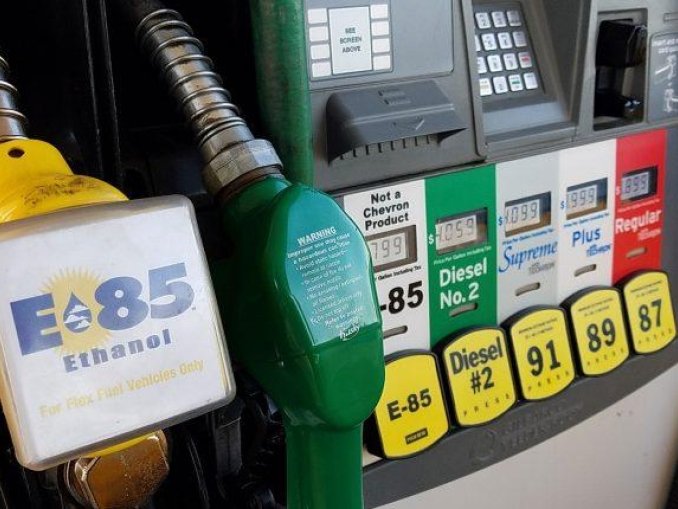Using ethanol in gas can be a controversial problem for many drivers. Is ethanol bad for your car? Today, we are doing a deep dive into one of the biofuels or additive fuels – Ethanol to find out whether it’s good or bad for your car engine. Ready to get down and dirty on the bad stuff and good stuff and we’re going to get to the truth!
Contents
What Is Ethanol Gas?
Ethanol (CH3CH2OH) is an alcoholic fuel, produced by fermentation and distillation of raw materials such as sugarcane juice, molasses, or starchy grains such as cassava, and corn… What does ethanol do in gas? Ethanol has been used by industrialized countries as a stand-alone fuel or added to gasoline to increase octane and reduce CO2 emissions.

When mixed with gasoline at a rate of 5-10%, it is possible to increase the octane (explosion-proof) by 3-5 units. E5 gasoline consists of 5% ethanol and 95% gasoline, and E10 gasoline has 10% ethanol. Biogasoline from E5 to E25 is called low ethanol, from E30 to E85 is a high ethanol blend and E100 is pure Ethanol after manufacturing.
The octane indicator (RON – Research Octane Number) both helps to compress gasoline better and decrease the self-ignition of gasoline, so the fuel industry is always looking for additives to increase the octane number of gasoline. That’s the reason why is ethanol in gas.
However, ethanol is different from other additives in that it can be considered as a fuel in itself, with an octane of up to 109 (regular unmixed gasoline has an octane of about 70, and A92 gasoline has a RON of 92), it is theoretically possible to completely replace conventional gasoline, however, your car engine must be designed for this type of fuel.
>> Related post: Can You Mix E85 With Regular Gas?
What Are The Benefits Of Using Ethanol Fuel
Do you know that 10 percent of every gallon of gasoline your car uses is ethanol (E10), and that percentage could rise to 15 percent (E15) currently? A statistic in the US shows that, of the total 550 billion liters of fuel consumed by motor vehicles in 2016, more than 53 billion liters were ethanol alcohol (equivalent to about 10%). It can be seen that ethanol is an important fuel in the future and we can’t deny some obvious advantages of using ethanol fuel like (E5, E10, or E15).
As we all know, ethanol has an octane (RON) as high as 108 – 109. So when it is mixed with gasoline, it increases the octane in the fuel. In addition, the composition of ethanol includes oxygen, which will help to burn fuel inside the engine more completely, which helps to reduce fuel consumption and minimize the emission of harmful substances (HC or CO) during engine operation.
Ethanol gasoline, also known as biofuel, is easy to imagine as an environmentally friendly fuel that helps protect the environment. In fact, the biggest significance of biofuel is that it helps to reduce dependence on fossil fuels as well as reduce fossil fuel consumption. Many people call ethanol a renewable energy source because new plants can be grown to supplement the materials needed to create it. In contrast, fossil fuels are considered a nonrenewable resource because they take millions of years to produce. So is ethanol gasoline a good choice for the health of your car’s engine? Let’s move to the next part!

Is Ethanol Bad For Your Car?
There are many opinions about whether to use ethanol gasoline for your vehicle. According to many sources of information from auto experts, ethanol gasoline with a low ethanol mixing ratio from E2- E10 can be used in car and motorcycle engines without any problems: “With a 5% ethanol ratio, the alternating use of E5 and regular gasoline has no effect on the engine.”
However, the information on biofuels all mentions the possibility of damaging the engine when ethanol is low in concentration (purity less than 99.5 degrees). Hydrophilic properties can lead to delamination, affecting normal fuel supply and engine performance. In addition, biofuels with higher ethanol ratios, from E15 and above, are only used in engines that have been designed to run this gasoline.
Damage the other parts in your car engine
Normal vehicles, if using gasoline fuel with high ethanol content, can affect some metal, rubber, plastic, and polymer parts of the engine because alcohol/alcohol is highly corrosive. Meanwhile, with fuel injection engines, the use of ethanol-mixed gasoline in fuel injection systems can also lead to premature failure of components such as supply pipes, fuel pumps, and fuel regulators. Ethanol is much more hygroscopic than gasoline. This can cause condensation inside the fuel tank, and other components such as the carburetor, injectors, cylinders, piping – or any other part with air gaps.
The presence of water in the fuel system will block the flow of fuel to the engine. It also has the potential to cause rust due to condensation in many metal parts. In engines that have used gasoline for a long time, the presence of alcohol will dissolve pre-existing deposits and rust that will enter the fuel system, and engine and clog the injectors when the fuel level is too low unless previously collected.
Consume more fuel
In addition, alcohol produces 34% less energy than unadulterated gasoline. That means that at the same capacity, ethanol-mixed gasoline will cause you to “lose” about 1.2 km of journey per liter (if calculated on E10 gasoline), this number will increase to 3.4 km for E85.
>> Read more: The Benefits of Using Dry Gas in the Fuel Tank
Which Vehicles Can Use Ethanol Gasoline?
According to the Renewable Fuels Association (RFA), regular vehicles can use gasoline between E0 and E10. Particularly for gasoline with a high ethanol ratio, such as E85, the vehicle’s engine must be designed appropriately. Currently, biogasoline has the highest percentage of ethanol at 85%. Vehicles that can use E85 (E85 = 85% ethanol + 15% gasoline) are called flexible fuel vehicles (FFVs).
This is a vehicle using an internal combustion engine, capable of running on any mixture of gasoline, gasoline, and ethanol with a content of up to 83% (E85). Flexible-fuel vehicles are SUVs, cars, or trucks. Currently, FFV models are developed by manufacturers like General Motors, Ford, Daimler, Chrysler, Mercury, Mazda, Isuzu, Mercedes và Nissan…
Not all vehicles can run on ethanol gas (even with high or low ethanol ratios). Federal Chamber of Automotive Industries (FCAI) – an organization representing Australian car and motorcycle manufacturers and importers, has issued a warning about ethanol gasoline and lists a series of models unsuitable for E5 or E10 gasoline:
Specifically, cars that can’t use E5 gasoline such as Audi A3 1.8L 2000 and earlier; Ford Laser manufactured from 1986 or earlier, and some models manufactured between 2002 – 2004. All Suzuki vehicles manufactured before 2008; Toyota Camry jet engine manufactured before July 1989 or Toyota Hilux, Toyota Hiace manufactured before August 1997…
Vehicles are incompatible with E10 gasoline: 2002 – 2004 Ford Focus models, 1996 – 2004 Transit models, 2007 Modeo; Lexus IS200 produced in May 2002; Peugeot 306 (XU engine); Many Subaru models from 1990 – 2005…
To be clear on this matter, auto experts say, most older vehicles are equipped with steel carburetors and fuel tanks. The use of combined ethanol gasoline in an engine can affect the air/fuel ratio due to the additional oxygen molecules in the chemical structure of ethanol.
FAQs
Is 10 percent ethanol bad for your car?
This question is asked by many drivers “ Does 10% ethanol fuel damage the car engine?” It will depend on your vehicle. 10% ethanol or you can call E10. As we know, alcohol can hold and absorb water. So you can’t use E10 for older vehicles or small gas engines. They shouldn’t contain any amount of ethanol. Because it will cause a leak in rubber parts and corrode steel parts in your engine. But you can absolutely use E10 gasoline in modern cars which use fuel injection.
The fuel in this type of engine will be continuously recirculated back into the fuel tank. Which will prevent the ethanol from separating into a gas. However, drivers should not pour E5 biofuel into the fuel tank. When the vehicle has not been started for 30 days or more. It can be seen that E10 is used quite commonly in many countries currently. More than 50 countries around the world have used ethanol mixed with the gasoline to drive cars, led by the US (over 90% of fuel ethanol is mixed with E10 gasoline).
What is the difference between ethanol and non-ethanol gas?
If you have to choose between using ethanol vs non-ethanol gas, you should know the key difference between these fuels. Before knowing the difference between ethanol vs non-ethanol you should know what is non-ethanol. Non-Ethanol gasoline or you can call recreational fuel or pure oil, as named it suggested, this type of fuel doesn’t include ethanol. This can be a big difference to distinguish between the two fuels and regular gasoline. Due to not having ethanol in this fuel, provides some advantages:
- There is less harm to your car engine
- It improves the mileage
- Using non-ethanol gas makes us less dependent on ethanol crops
To help you understand the difference between ethanol and non-ethanol gasoline, we will brief key factors in this table below:
| Ethanol gasoline | Non-ethanol gasoline |
| Having alcohol and absorbing water which can cause your engine damage and the fuel system to. | Do not harm your car engine. |
| This fuel is environmentally friendly because it reduces emissions. | Making more emissions compared to ethanol or regular gasoline |
| Ethanol gas has a shorter lifespan (3 months) | Non-ethanol gas can last longer (6 months) when it is stored properly. |
| Less expensive because ethanol is made from corn and other plants and it doesn’t cost too much to produce. | More expensive since its transportation and production costs. |
| Consume more fuel | Improve the gas mileage |

Can you mix ethanol and non ethanol gas in a car?
Our answer is “Yes”. It is not a big problem to mix non-ethanol and ethanol gasoline in your car especially when you use a flexible fuel vehicle. Of course, we all know that using the preferred fuel could give your car the best performance. But in some situations, mixing ethanol and free ethanol can be an option in emergency cases. When pouring non-ethanol into ethanol gasoline in your car, a new mixture (blend) will be created. On the contrary, the ratio of ethanol will increase. But you need to make sure that ethanol in gasoline doesn’t go up to 85% ethanol. Because it can hurt the engine of your car as we analyzed above.



